
Compost is a mixture of ingredients used as plant fertilizer and to improve soil's physical, chemical, and biological properties. It is commonly prepared by decomposing plant and food waste, recycling organic materials, and manure. The resulting mixture is rich in plant nutrients and beneficial organisms, such as bacteria, protozoa, nematodes, and fungi. Compost improves soil fertility in gardens, landscaping, horticulture, urban agriculture, and organic farming, reducing dependency on commercial chemical fertilizers. The benefits of compost include providing nutrients to crops as fertilizer, acting as a soil conditioner, increasing the humus or humic acid contents of the soil, and introducing beneficial microbes that help to suppress pathogens in the soil and reduce soil-borne diseases.

Permaculture is an approach to land management and settlement design that adopts arrangements observed in flourishing natural ecosystems. It includes a set of design principles derived using whole-systems thinking. It applies these principles in fields such as regenerative agriculture, town planning, rewilding, and community resilience. The term was coined in 1978 by Bill Mollison and David Holmgren, who formulated the concept in opposition to modern industrialized methods, instead adopting a more traditional or "natural" approach to agriculture.

Vermicompost (vermi-compost) is the product of the decomposition process using various species of worms, usually red wigglers, white worms, and other earthworms, to create a mixture of decomposing vegetable or food waste, bedding materials, and vermicast. This process is called vermicomposting, with the rearing of worms for this purpose is called vermiculture.
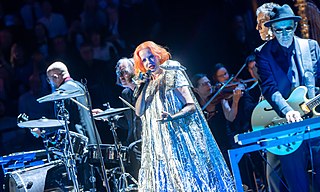
Garbage is an American rock band formed in 1993 in Madison, Wisconsin. The band's line-up—consisting of Scottish singer Shirley Manson (vocals) and American musicians Duke Erikson, Steve Marker, and Butch Vig —has remained unchanged since its inception. All four members are involved in the songwriting and production process. Garbage has sold over 17 million albums worldwide.

A composting toilet is a type of dry toilet that treats human waste by a biological process called composting. This process leads to the decomposition of organic matter and turns human waste into compost-like material. Composting is carried out by microorganisms under controlled aerobic conditions. Most composting toilets use no water for flushing and are therefore called "dry toilets".

Night soil is a historically used euphemism for human excreta collected from cesspools, privies, pail closets, pit latrines, privy middens, septic tanks, etc. This material was removed from the immediate area, usually at night, by workers employed in this trade. Sometimes it could be transported out of towns and sold on as a fertilizer.
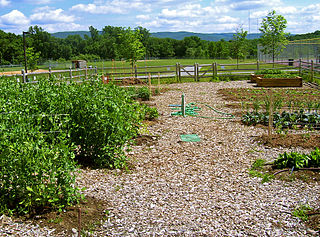
Organic horticulture is the science and art of growing fruits, vegetables, flowers, or ornamental plants by following the essential principles of organic agriculture in soil building and conservation, pest management, and heirloom variety preservation.
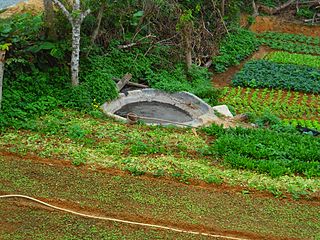
Organic fertilizers are fertilizers that are naturally produced. Fertilizers are materials that can be added to soil or plants, in order to provide nutrients and sustain growth. Typical organic fertilizers include all animal waste including meat processing waste, manure, slurry, and guano; plus plant based fertilizers such as compost; and biosolids. Inorganic "organic fertilizers" include minerals and ash. The organic-mess refers to the Principles of Organic Agriculture, which determines whether a fertilizer can be used for commercial organic agriculture, not whether the fertilizer consists of organic compounds.

TerraCycle is a private U.S.-based recycling business headquartered in Trenton, New Jersey. It primarily runs a volunteer-based recycling platform to collect non-recyclable pre-consumer and post-consumer waste on behalf of corporate donors, municipalities, and individuals to turn it into raw material to be used in new products. TerraCycle also manages Loop, a consumer-products shopping service with reusable packaging.
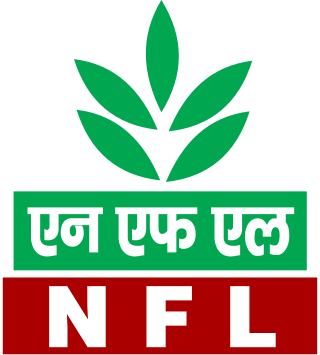
National Fertilizers Limited (NFL) is an Indian central public sector undertaking and the largest government-owned-Urea fertilizer-producer in India as of 2022. It is a Miniratna (Cat-1) company, with the Government of India owning a majority stake.

Sultan Ahmed Ismail is an Indian soil biologist and ecologist. His work has centred on techniques for recycling biodegradable waste into fertilizer using local varieties of earthworms, and on soil bioremediation.

Tom Szaky is the CEO and founder of TerraCycle, a private, US-based business headquartered in Trenton, New Jersey that turns non-recyclable pre-consumer and post-consumer waste into raw material to be used in new products.

Manure is organic matter that is used as organic fertilizer in agriculture. Most manure consists of animal feces; other sources include compost and green manure. Manures contribute to the fertility of soil by adding organic matter and nutrients, such as nitrogen, that are utilised by bacteria, fungi and other organisms in the soil. Higher organisms then feed on the fungi and bacteria in a chain of life that comprises the soil food web.
Mary Arlene Appelhof (1936–2005) was an American biologist, vermicomposter, and environmentalist. Her 1982 book Worms Eat My Garbage is still held as seminal reading in the field of vermicomposting. In 2009 she was designated a Women's History Month Honoree by the National Women's History Project.
Organic hydroponics is a hydroponics culture system based on organic agriculture concepts that does not use synthetic inputs such as fertilizers or pesticides. In organic hydroponics, nutrient solutions are derived from plant and animal material or naturally mined substances. Most studies on the topic have focused on the use of organic fertilizer.

Reuse of human excreta is the safe, beneficial use of treated human excreta after applying suitable treatment steps and risk management approaches that are customized for the intended reuse application. Beneficial uses of the treated excreta may focus on using the plant-available nutrients that are contained in the treated excreta. They may also make use of the organic matter and energy contained in the excreta. To a lesser extent, reuse of the excreta's water content might also take place, although this is better known as water reclamation from municipal wastewater. The intended reuse applications for the nutrient content may include: soil conditioner or fertilizer in agriculture or horticultural activities. Other reuse applications, which focus more on the organic matter content of the excreta, include use as a fuel source or as an energy source in the form of biogas.

A vermifilter is an aerobic treatment system, consisting of a biological reactor containing media that filters organic material from wastewater. The media also provides a habitat for aerobic bacteria and composting earthworms that purify the wastewater by removing pathogens and oxygen demand. The "trickling action" of the wastewater through the media dissolves oxygen into the wastewater, ensuring the treatment environment is aerobic for rapid decomposition of organic substances.
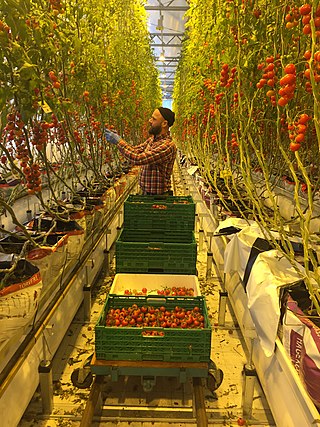
Digeponics (pronounced die-jeh-ponics, as in digestion) is a method of agriculture which integrates the products of anaerobic digestion, including CO2 and digestate, with greenhouse cultivation of vegetables.
Vermifilter toilet, also known as a primary vermifilter,vermidigester toilet, tiger toilet or tiger worm toilet, is an on-site sanitation system in which human excreta are delivered from a toilet onto a medium containing a worm-based ecosystem. Faecal solids are trapped on the surface of the vermifilter where digestion takes place. Liquids typically flow through drainage media, before the effluent is infiltrated into the soil.
Home composting is the process of using household waste to make compost at home. Composting is the biological decomposition of organic waste by recycling food and other organic materials into compost. Home composting can be practiced within households for various environmental advantages, such as increasing soil fertility, reduce landfill and methane contribution, and limit food waste.
















